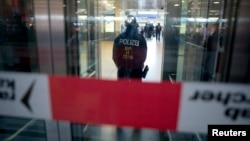After years of feeling insulated from militant Islamist threats, Germans are
worrying that they too could be subject to attacks like those suffered last week in Paris.
The Paris attackers' attempts to suicide-bomb last Friday's Germany-France soccer match in the French capital pricked Germans' security bubble. The shock was compounded on Tuesday when authorities cancelled a friendly match on home turf against the Netherlands, citing what they called a concrete security threat.
The twin threats struck at the heart of popular culture in Germany, soccer's World Cup holders, unnerving a people who felt for years that their opposition to the Iraq war and their low-key involvement in Afghanistan meant they would not be targeted.
"After the cancellation of the international match, our Germany is no longer our Germany," columnist Franz Josef Wagner wrote in mass-selling daily Bild's Thursday edition. "I'm not a hero, I'm worried."
Bild said several attackers planned to set off multiple explosives in the Hanover stadium on Tuesday.
On Wednesday, Interior Minister Thomas de Maiziere said Germany had only avoided a major attack "through a mix of competence and luck", adding: "We cannot guarantee that there won't be a terrorist attack in Germany."
Germany's failure to bust the Hamburg al Qaeda cell that planned the Sept. 11 attacks in 2001 marked a bad blip in its record, but the fact the strikes took place in the United States did not ruffle the national sense of security.
Germany stepped up its guard against Islamist militants, improved coordination between its numerous state and federal police and security agencies, and uncovered periodic plots, escaping the kind of al Qaeda-inspired attacks that killed 191 people in Madrid in 2004 and 52 in London the following year.
Now, the sudden realization that they too could be hit has shocked Germans. They have not suffered such a threat since the 1970s, when the ultra-leftist Red Army Faction (RAF) attacked the political and business elite in a campaign of assassinations and kidnappings that peaked in the "German Autumn" of 1977.
Then-chancellor Helmut Schmidt's response was uncompromising. After three high-profile killings by the RAF that year, he insisted: "The state ... must respond to this with all necessary severity."
Schmidt won widespread praise for refusing to bend to RAF demands for the release of jailed guerrillas. The group pursued its campaign, but never with the same potency, and its attacks petered out over the next two decades.
Don't mention war
The present government does not share Schmidt's impulses. Forged by the post-war experiences of economic growth, peace and reunification, the words and demeanor of today's cabinet members reflect Germans' aversion to fighting fire with fire.
While French President Francois Hollande vowed on Monday that "France is at war", German Vice Chancellor Sigmar Gabriel said a day later that speaking about a war against Islamic State only helps the group behind the bloody attacks in Paris.
Chancellor Angela Merkel has appeared drawn and exhausted after the Paris attacks, declaring in the immediate aftermath that "we are crying" with the French people.
Her government, a coalition of her conservatives and Gabriel's Social Democrats, has sent arms to Kurds fighting Islamic State militants but is not ready to join air attacks on the group in Syria, despite pledging solidarity with France.
Merkel also wants to avoid undoing Germany's attempts to integrate its Muslim immigrants, who are mainly of Turkish origin, unlike the North African Arabs that moved to France.
"The Muslims in Germany are Turks - the Germans of the Muslim world," said John Kornblum, a former U.S. ambassador to Germany. "You have nothing in Germany that compares to the banlieues [suburbs] in France or the conditions in the UK and Belgium."
"There isn't the bitterness that exists in some of these other countries," he added.
"Don't retreat"
German officials from de Maiziere down are urging Germans not to change their way of life. The state premier of Lower Saxony, Stephan Weil, vowed after the threat to the soccer match in Hanover: "I will certainly not retreat into my shell."
But government officials also acknowledge that people are worried about the threat of an attack, as well as the risks attached to Germany's open borders, and the implications of up to 1 million refugees — many from Syria - arriving this year.
"We have observed more than 60 attempts by Islamists to recruit from refugee shelters," German police chief Holger Muench said on Wednesday, adding that police were working in "crisis mode" in many areas.
Government officials say many people are worried there is no end in sight to the Paris-style risks and problems, and to the pressure on resources from the influx of refugees into Germany.
Nowhere are these fears greater than in the southern state of Bavaria, which is bearing the brunt of the refugee arrivals.
"People are of course very concerned," said Florian Hahn, a member of parliament for the Christian Social Union (CSU), Bavarian sister party to Merkel's conservatives, speaking from his office in Bavaria. "We are not deceiving ourselves."





